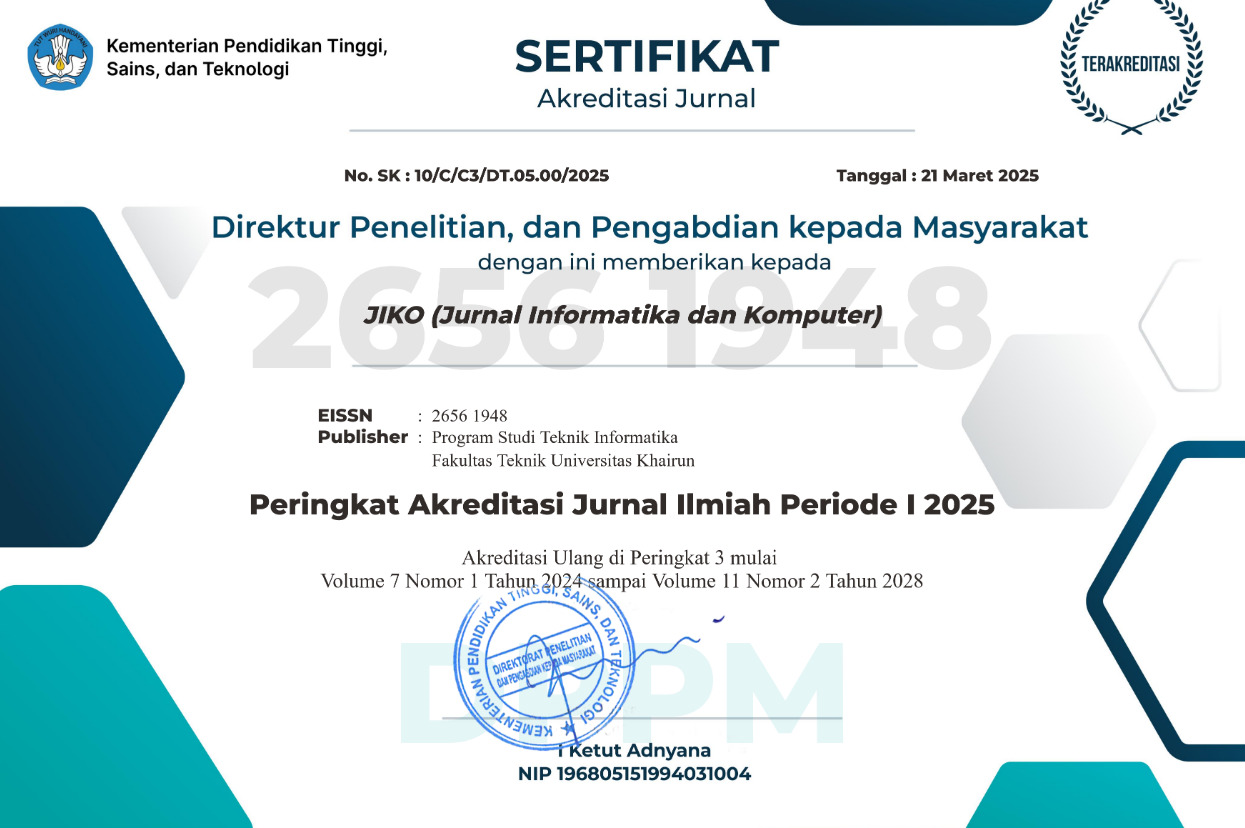ANALYSIS OF FUZZY C-MEANS IN PERSONALITY CLUSTERING BASED ON THE OCEAN MODEL
Abstract
Personality is the pattern of an individual's behavior in daily life, reflected in their thoughts, feelings, and actions. The Big Five Personality Traits Model, known as OCEAN, helps to understand the complexity of human personality through five main traits. The identification and classification of personality, particularly among students, impacts academic performance, personal development, anxiety levels, and risky behaviors. Collaboration between educators, mental health professionals, and career advisors is crucial to creating an educational environment that supports students' holistic development. The Fuzzy C-Means (FCM) method is used to identify students' personalities with adequate accuracy. This study adopts the OCEAN model with FCM to efficiently identify and classify students' personalities. Data were obtained from 142 respondents, resulting in 27% of respondents being classified in cluster 1, 21% in cluster 2, 18% in cluster 3, 16% in cluster 4, and 18% in cluster 5. This study has important implications for students, educators, and educational institutions to understand that learning patterns, social interactions, and decision-making processes can be influenced by an individual's personality.
Full Text:
PDFReferences
T. Simanullang, “PENGARUH TIPE KEPRIBADIAN THE BIG FIVE MODEL PERSONALITY TERHADAP KINERJA APARATUR SIPIL NEGARA (KAJIAN STUDI LITERATUR MANAJEMEN KEUANGAN),†vol. 2, no. 2, 2021, doi: 10.38035/jmpis.v2i2.
W. A. Djula, K. Penulis, : Wilhelmus, and A. Djula, “PENGARUH THE BIG FIVE MODEL PERSONALITY TERHADAP KINERJA PEGAWAI PADA KANTOR DINAS PENDIDIKAN KABUPATEN MAPPI,†vol. 2, no. 6, 2021, doi: 10.31933/jemsi.v2i6.
L. A. Sari, Onsardi, and S. Ekowati, “PENGARUH KECERDASAN EMOSIONAL DAN KEPRIBADIAN TERHADAP KINERJA KARYAWAN PT. BNI SYARIAH BENGKULU,†vol. 1, 2020.
G. Jiang, M. Xu, S.-C. Zhu, W. Han, C. Zhang, and Y. Zhu, “Evaluating and Inducing Personality in Pre-trained Language Models,†2022. [Online]. Available: https://sites.google.com/view/machinepersonality
L. Arisca, Karoma, and A. Syarifuddin, “PENGARUH KOMPETENSI KEPRIBADIAN GURU PAI TERHADAP KECERDASAN EMOSIONAL SISWA DI SMP NEGERI 06 PALEMBANG,†vol. 2, 2020.
C. González-Barbera, A. A. Chaparro, and J. Caso-Niebla, “Student Profiles and Academic Achievement in Mexican Middle Schools,†International Education Studies, vol. 12, no. 1, p. 90, Dec. 2018, doi: 10.5539/ies.v12n1p90.
N. Stormon et al., “Empathetic, persistent and female: A snapshot of oral health therapy students in Australia and New Zealand,†European Journal of Dental Education, vol. 26, no. 1, pp. 206–215, Feb. 2022, doi: 10.1111/eje.12689.
P. R. N. Saputra and A. Chusyairi, “Perbandingan Metode Clustering dalam Pengelompokan Data Puskesmas pada Cakupan Imunisasi Dasar Lengkap,†vol. 1, no. 3, pp. 1077–1084, 2020.
R. D. Christyanti, D. Sulaiman, A. P. Utomo, and M. Ayyub, “Implementation of Fuzzy C-Means in Clustering Stunting Prone Areas,†International Journal of Natural Science and Engineering, vol. 6, no. 3, pp. 110–121, Oct. 2022, doi: 10.23887/ijnse.v6i3.53048.
G. P. Aulia, T. Widiharih, and I. T. Utami, “PENERAPAN TEXT MINING DAN FUZZY C-MEANS CLUSTERING UNTUK IDENTIFIKASI KELUHAN UTAMA PELANGGAN PDAM TIRTA MOEDAL KOTA SEMARANG,†Jurnal Gaussian, vol. 12, no. 1, pp. 126–135, May 2023, doi: 10.14710/j.gauss.12.1.126-135.
I. M. Nur, A. N. L. Syifa, M. Kharis, and S. Heidy Permatasari, “IMPLEMENTASI METODE FUZZY C-MEANS DALAM PENGELOMPOKKAN HASIL PANEN PADI DI PROVINSI BALI,†VARIANCE: Journal of Statistics and Its Applications, vol. 5, no. 1, pp. 13–24, Sep. 2023, doi: 10.30598/variancevol5iss1page13-24.
A. N. Anwar, “IMPLEMENTASI FUZZY C-MEAN (FCM) UNTUK MENENTUKAN PENERIMA BEASISWA,†|Jurnal Ilmu Komputer JIK, vol. VI, no. 01, 2023.
N. Putra and I. D. Saputra, “Metode Fuzzy untuk Mengidentifikasi Kepribadian Siswa,†Jurnal Sistim Informasi dan Teknologi, pp. 136–142, Sep. 2022, doi: 10.37034/jsisfotek.v4i3.165.
C. Börekci, “Investigating High School Students’ Personality Traits and Academic Procrastination with Cluster Analysis,†European Journal of Psychology and Educational Research, vol. 5, no. 1, pp. 63–76, Jun. 2022, doi: 10.12973/ejper.5.1.63.
R. E. Febriansah, V. Firdaus, and M. Junaedi, “Application of The Big Five Personality Test in Designing Lecturer Recruitment and Selection Pengaplikasian Uji Kepribadian The Big Five Dalam Merancang Rekrutmen dan Seleksi Dosen,†2022. [Online]. Available: https://pssh.umsida.ac.id.
W. Muzayyanah, S. Lestanti, and S. N. Budiman, “Penerapan Metode Fcm Dan Topsis Pada Pemilihan Cabang Baru Cling Laundry,†vol. 6, 2024.
Sri Kusumadewi dan Hari Purnomo, Aplikasi Logika Fuzzy untuk pendukung keputusan. Yogyakarta: Graha Ilmu, 2010.
DOI: https://doi.org/10.33387/jiko.v7i3.8369
Refbacks
- There are currently no refbacks.











